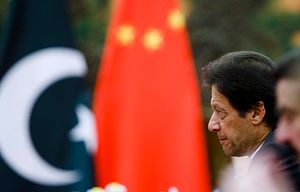Since the announcement of the multibillion-dollar China-Pakistan Economic Corridor (CPEC) project, Pakistani officials have been over-excited about its potential success. Day and night, the mainstream Pakistani media has been packed with stories about the CPEC. Businessman, journalists, and tourists from across the country began visiting Gwadar, a port town in Pakistan’s southwestern Balochistan province, the epicenter of the CPEC.
The CPEC was announced in 2015, during Prime Minister Nawaz Sharif tenure. The Sharif government took great pride and credit for the overarching project up until Nawaz Sharif’s removal from office in mid-2017. During Sharif’s final stint as prime minister, the CPEC was king. If a journalist or a paper published something critical about the CPEC, they would be dubbed anti-development and possibly a traitor. Instead, newspapers and TV channels highlighted the positive aspects of the CPEC in Pakistan ad nauseam.
Over the years, Chinese involvement in Pakistani affairs has increased immensely. On the Pakistani side, some within the business community remained apprehensive about China’s investments while others were hesitant for Islamabad to drift too much into Beijing’s orbit. The Chinese side also had reservations about Pakistan, particularly regarding opportunities for corruption in CPEC projects. But while the Sharif government stood, Islamabad took a concessionary tone toward Beijing when it came to the CPEC.
Shezad Baloch, a journalist is pursuing a PhD in the United States, is of the opinion that Pakistan is going through a very serious economic and political crisis. “The country doesn’t have any other choice than protect Chinese interests in the region and accept whatever they offer in return.” He adds, “That is why we see there is no discussion and talk about CPEC.”
As in the past, Baloch regrets, “there is still no independent reporting on CPEC projects and Gwadar. “
In recent years, the journalists who have been allowed to visit Gwadar were either from China or Pakistan’s state-run news media outlets. It is a typical Chinese way of handling media,” Baloch says.
Unlike Sharif, current Pakistani Prime Minister Imran Khan and his government, as it seems, are either less bothered about the CPEC projects or the Chinese have categorically cautioned them about corrupt practices surrounding the projects. Since Khan assumed office, talk about the CPEC has subsided somewhat in the country, as has discussion of China. Pakistan’s policymakers, it appears, are focused on improving ties with the United States.
Independent analysts are of the view that Pakistan can no longer anger the United States at the expense of China. Given Pakistan’s increasing dependence on China, the United States and India have moved closer to each other. Both the United States and China are important to Pakistan, and Islamabad needs to find a way to balance the two. India perhaps sees an opportunity in Pakistan being torn between its two divergent partners.
China has invested heavily in Pakistan, but pays far less attention to security concerns than Western investors do. Furthermore, Pakistan’s overall economic health — or lack thereof as they case may be — appears to be a lower priority for China. That said, some analysts say that Pakistan has tried to broaden its investor base and avoid putting all its eggs in China’s basket.
Some critics view the situation differently. According to them, allegations of corruption have frustrated Chinese officials, and it is the Chinese side that has slowed the pace of CPEC projects. The Chinese side also has closely watched restrictions imposed upon Pakistan by the IMF with regard to the CPEC. The IMF categorically warned that Pakistan could not pay off its CPEC loans with its IMF loans.
Michael Kugelman, deputy director of the Asia Program and South Asia senior associate at the Wilson Center, does not think CPEC has been shelved. But, he adds, it certainly has lost momentum. Speaking to The Diplomat, Kugelman says, “It’s not in the public eye as much as it had been, and we’re not hearing as many announcements about new and completed projects.”
One factor at play, Kugelman suggests, is Islamabad’s increasing hesitation to take on projects with such a heavy debt risk. Pakistan is suffering through a serious and sustained balance of payments crisis, and it can’t afford to take on more debt right now, he adds. According to Kugelman, Pakistan needs to focus on its new austerity plan as the latest IMF bailout package is implemented, and that doesn’t leave much room for CPEC projects.
Kugelman further stresses that this isn’t to understate Islamabad’s continued commitment to the CPEC. “Partnering with its critical ally on projects that, potentially at least, can deliver positive outcomes such as higher employment, better infrastructure, and more energy security — this remains a major opportunity that Pakistan won’t want to squander. What’s changed now is that Islamabad appears to want to capitalize on this opportunity in a more cautious and slower fashion than it had previously,” Kugelman argues.
Various reasons have been put forth as explaining the stalled CPEC projects, including the prevailing financial crunch confronting the Pakistani government and non-cooperation of the bureaucracy due to fear of the National Accountability Bureau (NAB).
The Chinese are closely viewing the situation in Pakistan. Their concerns, instead of being addressed, have been further compounded. In the past, China would release loan payments before work on a CPEC project began. Now, Beijing appears to wait for project work to commence before releasing funds. Given that the Pakistani government does not have the funds to begin, the projects stall. This does not augur well for the future of CPEC-related investments.
The writer works with Pakistan’s daily Dawn.
































